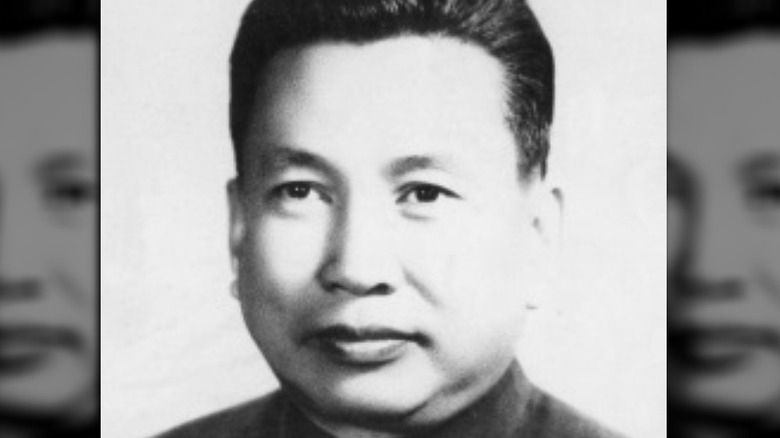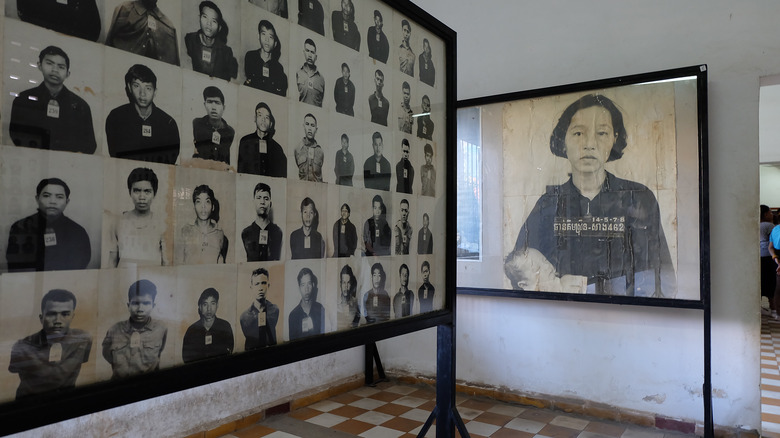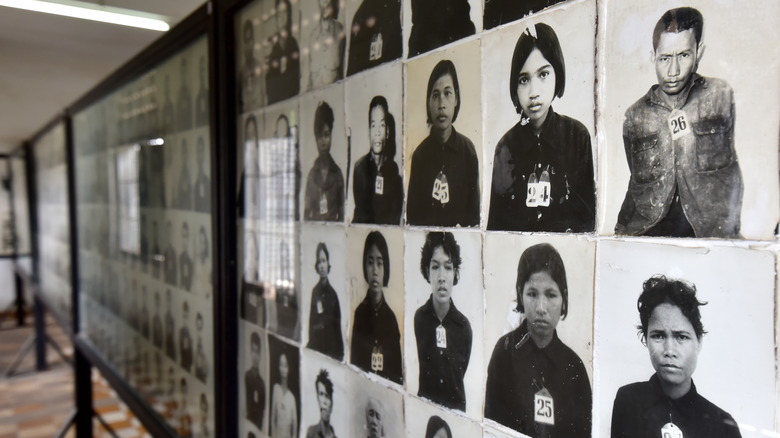How Cambodia's Pol Pot Became One Of The World's Worst Dictators
The history of the last century or so is filled with the stories of dictators: men (and in some cases, women) who ruled over their countries with an iron fist, to the detriment of everyone but themselves. The list of human rights abuses, such as torture, genocide, forced labor, and other practices, inflicted by dictators upon their populations is lengthy and won't be repeated here. And unfortunately, dictatorship is not a thing of the past: even in Europe (Belarus, to be specific, per Business Insider) a dictator holds power.
One of the most shocking and brutal dictatorial regimes of the 20th century was that of Pol Pot. With his Khmer Rouge party, he ruled over Cambodia so brutally that in a four-year period, as BBC News reports, up to 2 million people were worked to death or starved to death. It was an attempt at social engineering that failed so spectacularly that history still continues to wrestle with how one man could wield so much power.
The beginning: a privileged upbringing
Saloth Sar was born in 1925 to a prosperous (by comparison to the rest of the country) landowning farmer in central Cambodia, according to BBC History. The country was, at the time, a French protectorate, and the young man was educated in French-speaking schools. In 1949, he went to Paris to study, and it was there he was exposed to the ideas of Marxism.
Writing for the Economics Department of George Mason University, Vincent Cook explained that Sar (who would later use the name Pol Pot) believed not just in Marxism, but in the ideals that informed it. As Cook notes, Marxist governments at the time, such as that of Yugoslavia or Maoist China, didn't try to implement what he (Cook) calls the "'higher' stage of communism," where money doesn't exist, there are no divisions of labor, etc. Instead, they tolerated some forms of capitalism as a practical necessity. Sar, however, didn't see things that way.
Now enamored with "pure" Marxism, Sar/Pot returned to Cambodia in 1953 and became a leader of an underground communist movement, calling itself the "Khmer Rouge."
The Khmer Rouge transforms Cambodia
Pol Pot would spend the next couple of decades in his jungle hideaway, trying, and failing, to make inroads against the regime of Prince Norodom Sihanouk, as BBC News reports. However, in 1970, the prince was deposed in a right-wing coup, and he and his forces joined with the Khmer Rouge for what would turn out to be a civil war that would last the next five years.
In 1975, Pot and his forces took the country's capital, Phnom Penh. On April 17, according to Time, the regime reset the calendar to "Year Zero" and began forcibly implementing its vision of turning Cambodia into a Marxist utopia. The city's hundreds of thousands of inhabitants were displaced, forced to go to work in the rice fields, where most would die of starvation and/or overwork. Money, private property, and religion were abolished. Anyone suspected of being an "intellectual," even if they wore glasses or spoke a foreign language, was executed on the spot or imprisoned, tortured, and killed, as BBC News reported, as was anyone who dissented.
The aftermath
The Khmer Rouge would rule Cambodia — or Kampuchea, as they called it — until 1979, when communist Vietnamese forces invaded and overturned the regime, as BBC History reports.
Pol Pot and his men would retreat into the countryside. Following would be another 20-year period of guerilla warfare in which the Khmer Rouge would try, and fail, to make headway against the new Cambodian government.
By 1997, even his own men had grown tired of him, and Pol Pot was arrested and tried, in what BBC News called a "show trial," and sentenced to house arrest. He died a year later, having never been truly brought to justice.
Indeed, in the ensuing decades, justice has largely eluded the hundreds of thousands of Cambodians whose lives were destroyed by Pol Pot and his men. In 2009, the United Nations set up a tribunal to try Khmer Rouge leaders, now aged men, and as of 2019, according to NPR News, only a handful had been convicted and sentenced.



